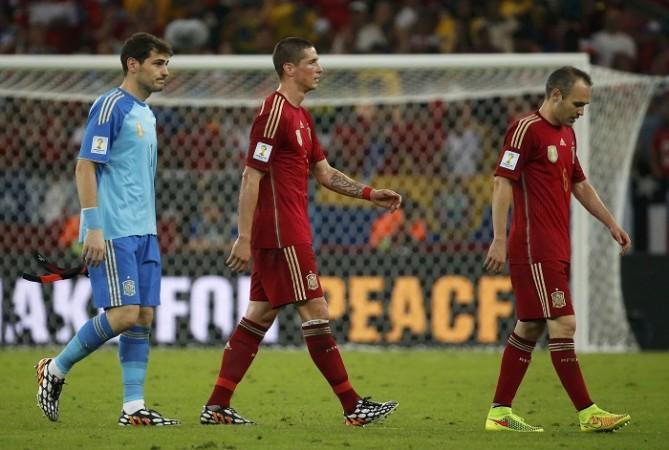
Watching Spain in their two matches at the FIFA World Cup 2014 in Brazil, made you wonder just how on earth they managed to win those three major international tournaments on the spin. But then, the one thing about football is that it never stands still, it keeps moving on, it keeps evolving, and the reason world champions Spain find themselves out of the tournament, is they stubbornly refused to evolve.
Tiki-taka has been a wonderful exponent to football, one of the most successful as well. Barcelona have won everything there is to win with that style of play, and Spain, who naturally took it up as well, considering the sheer weightage of Barca players in the squad, enjoyed monumental success over the past six years.
Signs that tiki-taka was being overwhelmed by a much more vibrant style has been there for everyone to see in the past two club seasons. Barcelona failed to win a single trophy with their trademark style last season, while being trampled by a quick and breathtaking Bayern Munich, while Bayern were not even remotely the force they were in 2012/13 playing it under Pep Guardiola in the 2013/14 season.
Question marks were raised if Spain could continue their dominance playing the same style, with fading stars. Xavi Hernandez, the best midfielder in the world for many a year, is getting on in years now and is not the same player -- – he did not make the starting lineup against Chile for the first time in a major tournament for six years – and neither is the unique Andres Iniesta. That elegance is still there, he still makes you sit up and watch every time he glides with the ball, but the effectiveness has come down.
Of the 11 players that started the game, only four of them were from Barcelona, and only two further Barca players were on the bench, three if you count Cesc Fabregas, who was forced to move back to the English Premier League purely because he couldn't quite settle into the tiki-taka system.
Yet, Spain and Vicente Del Bosque stubbornly stuck to the system that has worked for six years, understandably from one point of view, but a system which showed it had plenty of chinks in it at the Confederations Cup in Brazil last year.
Spain only just about managed to negotiate Italy before being outclassed by Brazil in the final. If there was ever a time for Del Bosque to take stock and realise something needed to change, or more importantly he needed a Plan B for when things went wrong, that was it.
However, there was no change, no compromise and no flexibility, like Del Bosque had insisted Spain were capable of heading into the must-win contest against Chile.
When goals were the order of the day, Del Bosque refused to change the system; there were no extra strikers thrown in – Diego Costa was replaced by Fernando Torres – and the likes of David Villa, so often the main man for Spain in major tournaments, did not even get a sniff.
Koke, one of the main catalysts in Atletico Madrid's incredible season, was underused, while questions could be asked about the need for both Sergio Busquets and Xabi Alonso in the same lineup, especially when Spain were playing Chile knowing the importance of a victory.
The Netherlands loss was humbling, but the Chile defeat was a lot more jarring; the South Americans giving everyone watching them play joy through their relentless pressing and explosive attacking style.
There were no 100 passes sprayed around sideways before eventually attempting to get to the rival team's box. Chile's style, masterminded by the brilliant Jorge Sampaoli, was direct and simple, yet tactically so astute that Spain had absolutely no answers.
Watching Spain over the last six years has been great fun; you never tire watching a winning team, especially one that plays football the right way -- even if tiki-taka might not be everyone's cup of tea. Spain might also bounce back in remarkable style and go all the way in Euro 2016, their next major international tournament; but logic suggests, Del Bosque, or whoever is in charge of the national side then, will need a Plan B, especially if Plan A is a style which has been found wanting time and again over the past couple of years.










